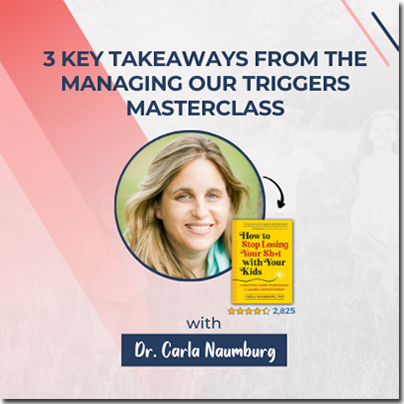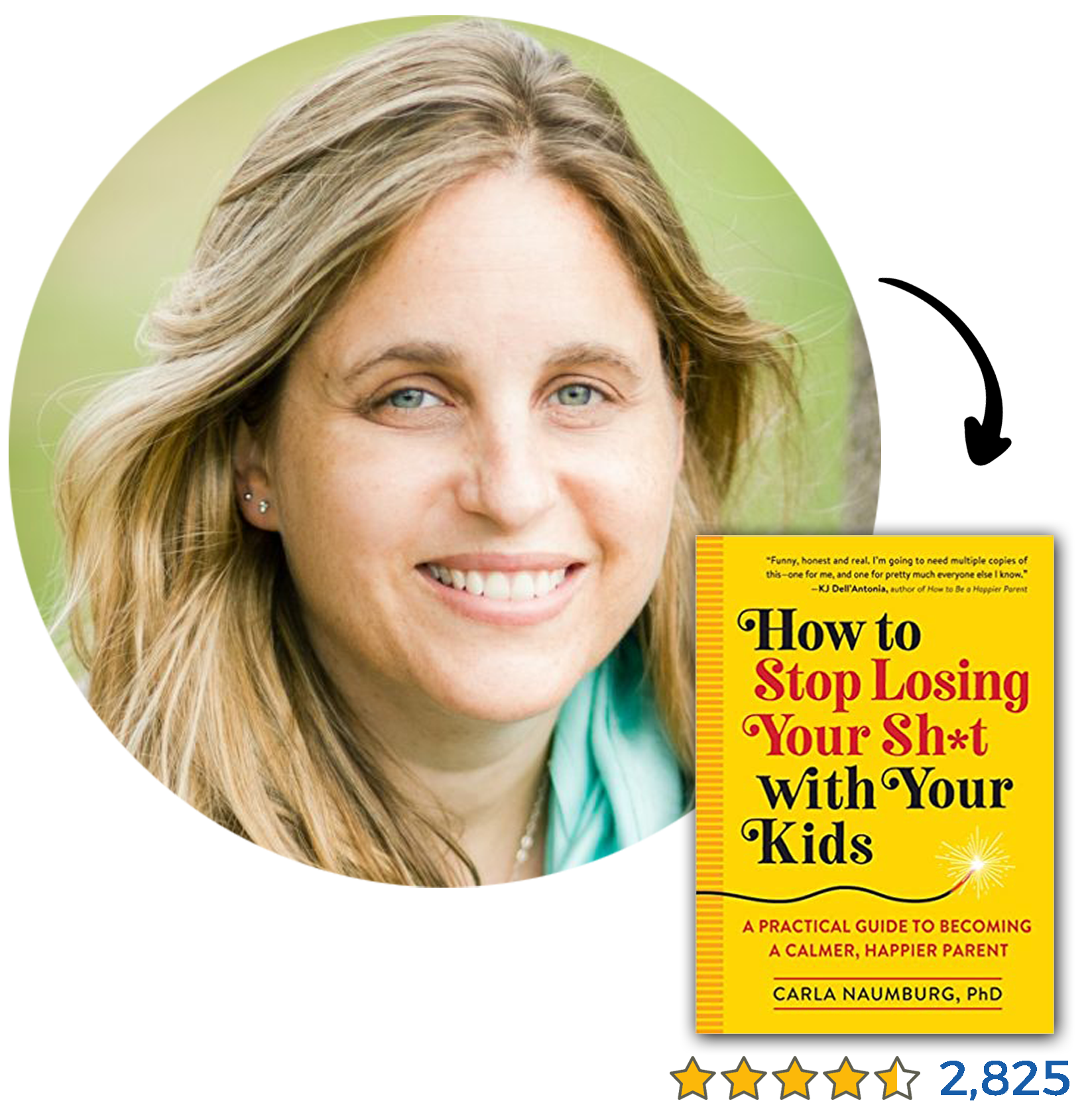 Some days, I seem to have endless patience with my kids. I can tell them seven times to put on their shoes without rolling my eyes once. I can look at that spilled cup of water and calmly remind them that we all make messes, but we have to clean them up, too. I can take a break from writing every few minutes to read the same book over and over again.
Some days, I seem to have endless patience with my kids. I can tell them seven times to put on their shoes without rolling my eyes once. I can look at that spilled cup of water and calmly remind them that we all make messes, but we have to clean them up, too. I can take a break from writing every few minutes to read the same book over and over again.
And other days, I’m one thrown toy or one lost sock away from a complete parental meltdown.
But that’s pretty much all of us, right?
In the Managing Our Triggers Masterclass, author and social worker Dr. Carla Naumburg opens up about her book How to Stop Losing Your Sh*t with Your Kids. She helps us to understand why we get triggered so easily some days, how to try to avoid adult meltdowns, and what to do when we realize we have just lost it—or are still mid-meltdown.
I was a researcher for this masterclass and getting the opportunity to read this book and help shape AFineParent’s interview with Dr. Naumburg was quite a blessing. This book is absolutely packed with information that I found relevant in my own life. As a single parent who works outside the home, I definitely have my days where it doesn’t take much to set me off! This masterclass is full of great ideas from Dr. Naumburg’s book that I have already started implementing in my own life.
Wondering what this book—and this masterclass—is all about? Here are three big takeaways to encourage you to give the whole class a go!
#1: You Can Learn to Recognize Meltdowns Before They Happen
 The other morning, my kids woke me up at about 5:30 AM. Now, this isn’t really that early for me; I normally get up at 4:30 for work. But this was Saturday, and I really wanted to sleep in until at least 7 AM. Or maybe even 6.
The other morning, my kids woke me up at about 5:30 AM. Now, this isn’t really that early for me; I normally get up at 4:30 for work. But this was Saturday, and I really wanted to sleep in until at least 7 AM. Or maybe even 6.
And when my kids woke me up, you know what I did? I burrowed under the covers. I told them to go away. I grumbled and grumped until I finally got up, and then I refused to make them hot cocoa, which is normally a Saturday morning ritual for us. In short, I was on the verge of a meltdown. I may not have been yelling or screaming quite yet, but I realized that I was getting close to really losing it.
The thing is, we all have these moments. That’s just part of parenting. As Dr. Naumburg reminds us, this is normal; losing it occasionally doesn’t make us bad parents. Nobody likes how it feels to break down like this, nor do we like the aftermath of a meltdown. But we can stop ourselves in the middle of a meltdown if we recognize what’s happening. Better yet, we can learn to recognize when we’re on the verge and then do something—anything—to break that tension.
What’s important is learning to recognize how we feel and act when we’re triggered, as well as what kinds of things trigger us in the first place. Sometimes these triggers are obvious: stress at work, sleep deprivation, a fight with our partner, money troubles. Other times the triggers may seem less obvious or much smaller; but too many of them can still pile up and make our buttons easy to push. When we’re triggered, it could mean tensing up, using one-word responses, breathing shallowly, or any number of other physical or mental behaviors.
 I’m still learning to recognize my own triggers, but every time I identify that feeling in myself, I make a point of pausing and saying, “I am feeling triggered right now.” And when I can recognize that the stress is piling up too high, I try to do as Dr. Naumburg suggests: “literally anything else” to keep myself from having a meltdown. Sometimes that’s a shower. Sometimes it’s jumping jacks. Sometimes it’s simply telling my kids I need a few minutes alone and then walking away.
I’m still learning to recognize my own triggers, but every time I identify that feeling in myself, I make a point of pausing and saying, “I am feeling triggered right now.” And when I can recognize that the stress is piling up too high, I try to do as Dr. Naumburg suggests: “literally anything else” to keep myself from having a meltdown. Sometimes that’s a shower. Sometimes it’s jumping jacks. Sometimes it’s simply telling my kids I need a few minutes alone and then walking away.
Have you ever thought about your own triggers? Dr. Naumburg’s book has a big list of potential triggers that’s worth perusing, or you might just spend some time thinking and writing your own list.
When you know what makes your own buttons bigger and more pushable, it becomes a lot easier to avoid losing it entirely with your kids.
#2: You Can Reduce Your Triggers
 I have been trying for months (let’s face it, years) to get back into a regular exercise routine. Not only because I like how exercise makes my body look and feel, but because I recognize that exercise makes me a happier person.
I have been trying for months (let’s face it, years) to get back into a regular exercise routine. Not only because I like how exercise makes my body look and feel, but because I recognize that exercise makes me a happier person.
I know that sounds silly and sugar-coated, but it’s true. On weekends when I get out for a run, I have more patience with my kids. On weekdays when I pull out my yoga mat before work, I have much more grace with customers. Simply moving my body makes me feel happier and less stressed.
One really important part of this masterclass is the understanding that we are capable of making ourselves less easily triggered. Dr. Naumburg uses the delightful acronym BURPs—BUtton Reduction Practices—to describe actions we can take to make our buttons much smaller and harder for our kids to find. She delves into much more detail in the masterclass, but for the sake of this takeaway, know that simple actions like doing one thing at a time (i.e. not multitasking), getting enough sleep, having a support network, and, yes, getting exercise can all help us keep our stress at a manageable level.
So I’ve been trying a little harder lately to get my workouts in. I may not be doing the hour-long sweat sessions I used to do before the birth of my youngest, but it’s amazing to me what a 20-minute yoga practice or a 2-mile run can do to reduce my trigger-ability. And on days when I incorporate other BURPs—going to bed at 9 instead of 10, or spending a few hours hanging out with friends—I definitely feel a difference.
The term “self-care” can feel problematic to a lot of people, but the truth is that we do need to take care of ourselves in order to not constantly be on the verge of losing control with our kids. What might that mean for you? Can you expand your support network? Can you try to focus on doing one thing at a time instead of the constant multitasking that’s so prevalent in our society? Now might be the time to think about some of the ways you can manage your own stress levels.
#3: You Can (and Should) Apologize to Your Kids
 A few weeks ago, I had a meltdown. It had been a long day—we’d gone to the park, had ice cream, and I was trying to fit in a few errands before we went home for the night. And my kids were being, well, kids. They wanted to go home. They were bored. They hated errands. Grumble, whine, complain.
A few weeks ago, I had a meltdown. It had been a long day—we’d gone to the park, had ice cream, and I was trying to fit in a few errands before we went home for the night. And my kids were being, well, kids. They wanted to go home. They were bored. They hated errands. Grumble, whine, complain.
And I blew up.
I’m not going to tell you what I said (though I could—goodness knows I’ve re-lived that memory many times over). But it wasn’t nice, and it definitely wasn’t the right response to the situation. In retrospect, I know I was feeling very triggered by the long day and a week’s worth of work stress. Before I knew it, all three of us were crying.
Early in my parenting journey, I read about the concept of “rupture, repair, repeat,” though I didn’t hear that exact phrase until many years later. Basically, things are going to happen to damage our connection with our children—that’s the rupture. But then, ideally, we work to repair that relationship. And of course, we’ll do it again—eventually, again and again. But because we keep working to repair our relationship every time, our bond with our kids gets deeper and stronger.
Dr. Naumburg points out that one of the most important steps we can take to repair things with our kids is to simply apologize. This is a surprisingly novel concept to many of us, but the fact is that when we apologize to our kids, we’re teaching them with our actions in a way that no lecture can manage.
They see that we’re human—we lose control sometimes, we behave badly. And then we own up to that behavior and apologize for any hurt we caused. And our kids see us setting that example, and eventually, they internalize the behavior.
How do you normally follow up when you have behaved badly toward your children? Do you look away, cover it up, or pretend it never happened? Do you admit wrongdoing but refuse to accept responsibility? If you’ve never done so before, now is the time to learn how to genuinely apologize to your children when the situation calls for it. This masterclass offers some guidance on how to do just that.
What I loved most about this masterclass is that it focuses not on our children’s behavior, but on ours. Many parenting books focus on getting the desired behavior out of kids, but it’s important to remember that the only behavior we can actually control is our own. These takeaways are just the beginning of the many important ideas Dr. Naumburg discusses in this masterclass. This masterclass is a must-watch—I hope you will!
 You can watch the full Managing Our Triggers Masterclass with Dr. Carla Naumburg for FREE during the online Positive Parenting Conference between May 17th – 24th, 2022. Each year 100,000+ parents join us for this amazing online event. Don’t miss it!
You can watch the full Managing Our Triggers Masterclass with Dr. Carla Naumburg for FREE during the online Positive Parenting Conference between May 17th – 24th, 2022. Each year 100,000+ parents join us for this amazing online event. Don’t miss it!
Up Next…
What comes to mind when you hear the term “social skills?” Playing nicely, making friends, being able to take turns? What if social skills actually encompass so much more than just the ability to interact well with others?
Join us next week as we discuss key takeaways from the Social Skills Masterclass with Janine Halloran.
 This informative masterclass puts a new spin on social skills and is packed full of tangible and fun games and activities that parents can do to give their children opportunities to practice social skills. See you next week!
This informative masterclass puts a new spin on social skills and is packed full of tangible and fun games and activities that parents can do to give their children opportunities to practice social skills. See you next week!
I appreciate you taking the time to read it!